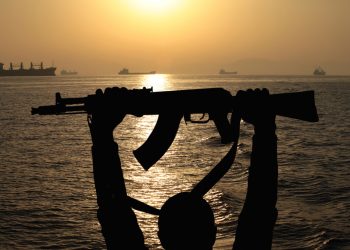The U.S. Navy must do more to stop piracy in the Indian Ocean
![]() The U.S. Navy must do more to stop piracy in the Indian Ocean and prevent seagoing Somali pirates from jeopardizing the lives of merchant ship crews.
The U.S. Navy must do more to stop piracy in the Indian Ocean and prevent seagoing Somali pirates from jeopardizing the lives of merchant ship crews.
That message was loud and clear at opening day of the Connecticut Maritime Association’s Shipping 2012 conference on Monday at the Stamford Hilton hotel, where 2,500 participants in the global shipping industry are attending three days of meetings on issues facing the multi-billion-dollar sector.
“Piracy is one of the biggest issues we face. We could suppress piracy if the U.S. Navy would take one iota of the steps our military has taken in Afghanistan and Iraq,” said Clay Maitland, president of the Trust Company of the Marshall Islands, the statutory maritime administrator of the Republic of the Marshall Islands, and moderator of Monday’s kickoff panel discussion. “We could very easily crush the Somali pirates, but there has been a political decision made.”
Maitland suspended the rules of the panel discussion limiting participants’ presentations after hearing Nicolas Pappadakis, head of A.G. Pappadakis & Co., Ltd., and chairman of Intercargo, a dry bulk shipping association, report that 11 merchant ships and 254 seafarers are being held for ransom.
“The trials and tribulations that happen in 2012 should never happen to anybody,” Pappadakis said, adding that ships that carry armed guards have fended off some attacks. “There’s still a need internationally to work with the IMO (International Maritime Organization) and United Nations to defeat the pirates. There are people who have been captives for over two years under atrocious conditions.”
The discussion comes after U.S. Navy Seals landed by helicopter in Sudan in January and rescued an American aid worker and a Danish friend, who had been captives since last October.
The question of prohibiting payment of ransom to obtain the release of captives has been debated, but Maitland and Alastair Evitt, managing director, Meridien Marine Management Ltd., and chairman of the Save Our Seamen campaign, said it would jeopardize captives even further.
Maitland challenged international shipping organizations to pressure governments to move against the pirates.
“Where is the Chamber of Shipping in the United States? It’s been very obvious that the U.S. government has been pulling its punches,” Maitland said, responding to a comment from the audience that the U.S. government sees the Somali pirates as a counterweight to terrorist organizations, including Al Shabab.
Maitlaind lambasted the U.S. and U.K. governments for not agreeing to take action against the pirates following a joint meeting 1 1/2 months ago.
Commenting that governments are concerned that the captives could be killed if they take action, Torben Skaanild, proprietor of Skaanild & Partners ApS and chairman of BIMCO, the Baltic & International Maritime Council, said the lack of intervention puts added pressure on shipping companies.
“We have approached governments directly. We have been absolutely clear about what we want done,” said Spyros Polemis. chairman and managing director of Seacrest Shipping Co., Ltd. “The navies are ready to act, but there is no political will.”
The conference, which continues Tuesday and Wednesday, includes 130 exhibitors serving the marine industry.
“There is a huge impact on the local economy,” said Lorraine Parsons, CMA event director. “It brings in a couple million dollars, I’d say.”
Source: Stamford Advocate



























































